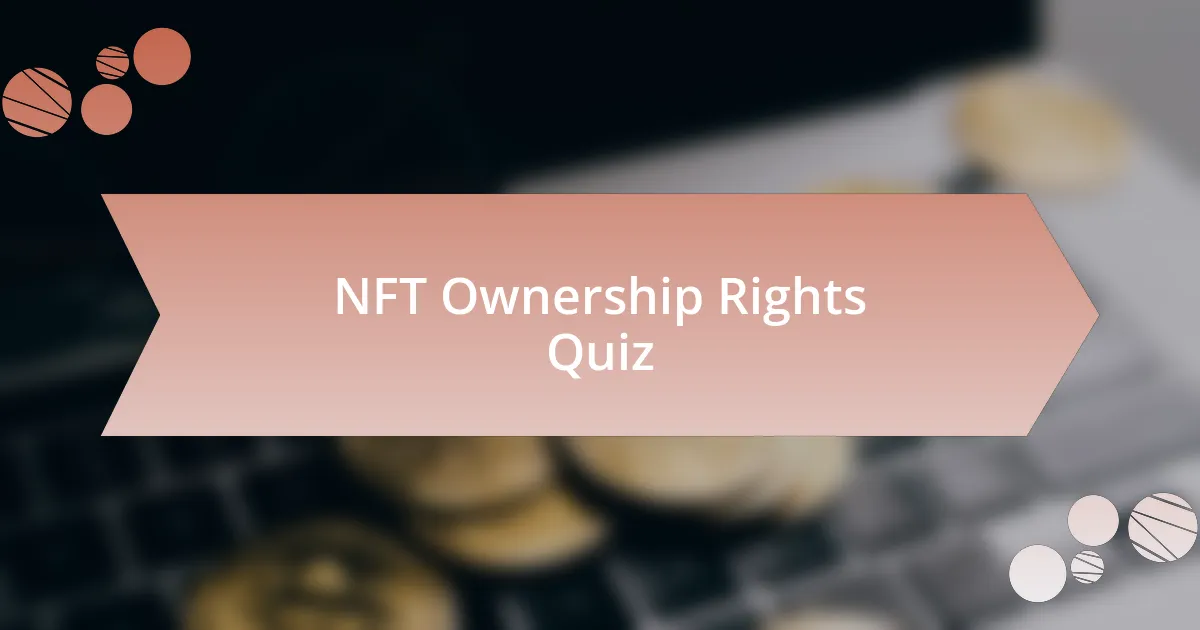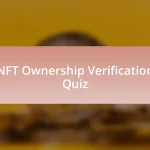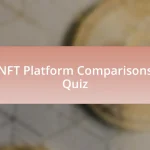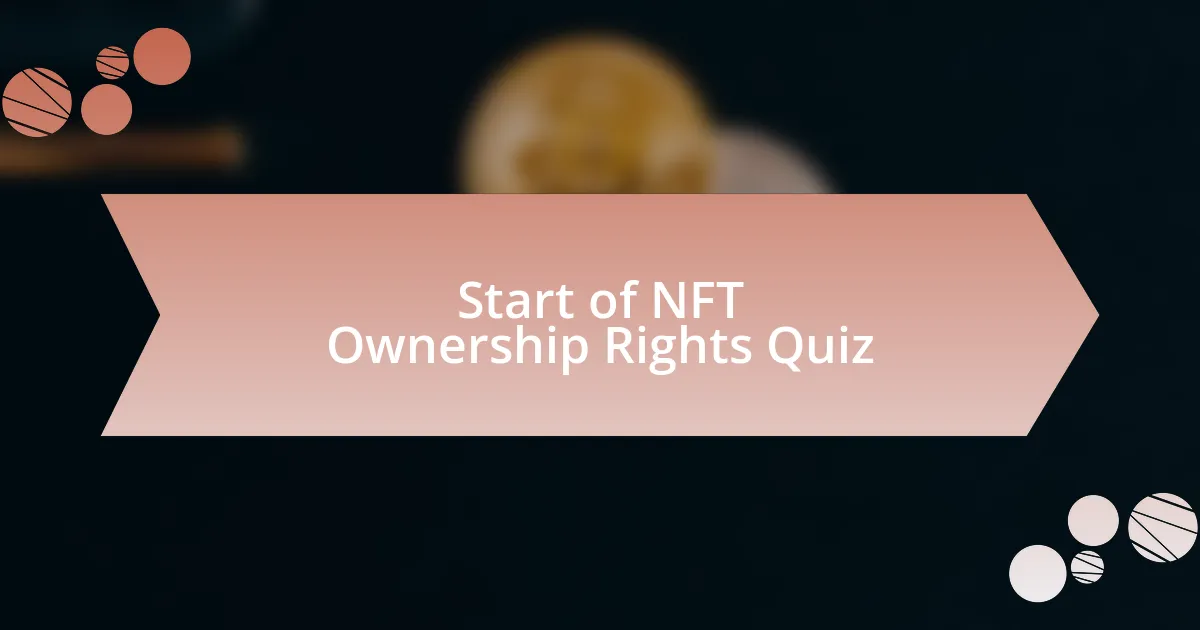
Start of NFT Ownership Rights Quiz
1. What is an NFT?
- A social media trend for sharing content online.
- A digital file format for images and videos.
- A unique digital asset allowing for digital ownership through blockchain technology.
- A type of currency used solely for online transactions.
2. What does `non-fungible` mean in the context of NFTs?
- It means that NFTs are interchangeable digital currencies.
- It means that NFTs can be exchanged for one another without loss.
- It means that all NFTs are identical and have the same value.
- It means that each NFT is unique and cannot be replicated or counterfeited.
3. How are NFTs different from cryptocurrencies?
- NFTs are identical tokens that serve as currency, just like cryptocurrencies.
- NFTs are cryptocurrencies that allow for the buying and selling of goods online.
- NFTs can be exchanged for any other type of NFT at any time, similar to cryptocurrencies.
- NFTs are unique digital assets with distinctive metadata and smart contracts, unlike cryptocurrencies which are fungible.
4. What is the primary use case for NFTs currently?
- Trading stocks on the stock market.
- Creation of physical assets for investment.
- Earning interest on digital currencies.
- Ownership of digital art, gaming, and collectibles.
5. Can NFTs be used to tokenize physical assets?
- No, NFTs cannot represent any real-world items.
- Yes, but only for virtual goods.
- Yes, NFTs can be used to tokenize physical assets.
- No, NFTs are only for digital art.
6. What is the significance of blockchain immutability in NFT ownership?
- Blockchain immutability allows NFTs to replicate easily and maintain their value.
- Blockchain immutability ensures that NFT ownership and transaction history cannot be altered, providing transparency and security.
- Blockchain immutability enables creators to change ownership without consent from buyers.
- Blockchain immutability makes NFT ownership records private and inaccessible.
7. How do smart contracts ensure creators receive royalties from NFT sales?
- Smart contracts automate ownership transfers and royalties, ensuring that creators receive a portion of sales even after the initial minting.
- Smart contracts only record the initial sale of the NFT without tracking future transactions.
- Smart contracts enable creators to chase down royalties through legal means after a sale occurs.
- Smart contracts eliminate the need for ownership verification and documentation for creators.
8. What is the role of ERC-721 in the NFT ecosystem?
- ERC-721 is the Ethereum standard for non-fungible tokens with unique properties.
- ERC-20 is a standard for fungible tokens that can be replaced.
- ERC-777 is an upgrade that enhances token functionality for transactions.
- ERC-1155 allows for semi-fungible tokens that can represent different types.
9. Can NFT metadata be changed?
- No, NFT metadata cannot be changed at all.
- Yes, NFT metadata can be changed by the owner.
- Yes, but only if the NFT is newly minted.
- No, once created, NFT metadata is permanently fixed.
10. What are the different NFT rarities for the first drop?
- common (750), rare (230), legendary (small amount)
- standard (600), limited (150), super rare (50)
- traditional (400), exclusive (100), mythical (10)
- basic (500), uncommon (300), epic (200)
11. How can I own a VanEck Community NFT?
- You need to create a cryptocurrency to access the NFT.
- You must purchase the NFT through a traditional auction house.
- You can sign up on the dedicated NFT webpage and fill out the form to receive an NFT via airdrop to your ETH address.
- You can only obtain the NFT by attending a VanEck event in person.
12. Will VanEck NFTs be listed on an NFT marketplace?
- No, VanEck NFTs will not be listed on an NFT marketplace.
- VanEck NFTs will be sold at auctions on different platforms.
- VanEck NFTs will be available for direct purchase on exchanges.
- Yes, VanEck NFTs will be listed on multiple marketplaces.
13. What are the legal considerations for NFT creators?
- Legal considerations are solely based on blockchain technology advancements.
- Legal considerations include copyright infringement, plagiarism, and ensuring fair use of digital art and media.
- Legal considerations only involve trademark registration and marketing strategies.
- Legal considerations are irrelevant as NFTs don’t follow traditional laws.
14. Can I sell `This` as an NFT if it infringes on someone else`s rights?
- Yes, selling an NFT that infringes on someone else`s rights is allowed under copyright law.
- No, selling an NFT that infringes on someone else`s rights can result in loss of the asset and costly IP disputes.
- Sure, you can sell an NFT that infringes on someone else`s rights, provided it`s a digital asset.
- Perhaps, selling an NFT that infringes on someone else`s rights can be done if you credit the original creator.
15. How do NFTs solve the problem of centralization?
- NFTs rely on third-party platforms to manage and verify ownership, increasing centralization.
- NFTs eliminate the need for blockchain technology and store data on centralized servers.
- NFTs solve the problem of centralization by ensuring freedom from the control of centralized authorities through decentralized verification.
- NFTs centralize digital ownership, making it easier for corporations to control assets.
16. What is NFT minting?
- NFT minting is the process of converting digital files into digital assets on a blockchain.
- NFT minting is deleting files that are no longer needed.
- NFT minting is trading physical items for cryptocurrency.
- NFT minting is creating copies of digital items for resale.
17. How are NFTs beneficial for creators?
- NFTs ensure that creators receive royalties from secondary sales.
- NFTs perform all financial transactions without fees.
- NFTs guarantee instant wealth for all creators.
- NFTs allow for unlimited duplication of digital files.
18. What are the benefits of NFTs in the digital art and collectibles space?
- NFTs eliminate the need for any transaction methods in the digital space.
- The benefits include unique ownership, immutability, and transparency, which enhance the value and authenticity of digital art and collectibles.
- The benefits include centralized control over digital assets and lack of transparency in sales.
- NFTs allow creators to copy their work easily without any restrictions.
19. Can NFTs be used to represent virtual real estate?
- No, NFTs are limited to digital art and collectibles only.
- Yes, but only for physical real estate, not virtual.
- Yes, NFTs can be used to represent virtual real estate in metaverse environments.
- No, NFTs cannot represent real estate in any form.
20. What are the ethical challenges in the NFT space?
- Guaranteeing instant profits for all creators.
- Providing universal access to high-speed internet.
- Ensuring fair pricing and equitable access to digital art.
- Eliminating all transaction fees completely.
21. What is the significance of HODL in the NFT space?
- HODL signifies a long-term investment strategy in the NFT space.
- HODL represents a strategy to create more NFTs.
- HODL means to immediately sell all NFTs at a profit.
- HODL indicates the process of minting new digital assets.
22. How do copyright and intellectual property laws apply to NFTs?
- Copyright and intellectual property laws do not apply to NFTs, allowing complete freedom of use.
- Copyright and intellectual property laws still apply to NFTs, and compliance with these laws is essential to avoid legal issues.
- Intellectual property laws only protect the creators of NFTs, not the assets themselves.
- Copyright laws apply only to physical assets and have no relevance to NFTs.
23. What is the role of blockchain technology in NFT ownership?
- Blockchain technology guarantees that NFTs can be easily replicated and sold in multiple copies.
- Blockchain technology records ownership changes of NFTs on an immutable ledger, ensuring transparency and provenance.
- Blockchain technology is used to store all digital files related to NFTs on a single centralized server.
- Blockchain technology is primarily used for creating cryptocurrencies and has no role in NFT ownership.
24. Can NFTs be fractionalized?
- NFTs can only be sold as part of a bundle.
- NFTs can be fractionalized and traded like stocks.
- No, NFTs cannot be fractionalized.
- Yes, NFTs can be fully divided.
25. What are the future plans for the VanEck Community NFT?
- Provide exclusive benefits to NFT holders.
- Distribute NFTs through public auctions.
- Migrate NFTs to different blockchains.
- Sell NFTs on major marketplaces.
26. How can investors buy NFTs?
- Investors can buy NFTs through traditional stock exchanges and brokers.
- Investors can buy NFTs via bank transfers to individual creators.
- Investors can buy NFTs only by directly contacting the artists for sales.
- Investors can buy NFTs by accessing crypto wallets and participating in NFT marketplaces.
27. What are the different types of crypto wallets?
- Mobile banking apps, physical safes, and credit unions.
- Software wallets, hardware wallets, and exchange wallets.
- PayPal wallets, cash reserves, and stock portfolios.
- Bank accounts, digital currencies, and credit cards.
28. Why should I join the VanEck Community?
- Membership is required to purchase VanEck stocks.
- Joining gives you direct access to fund managers for investment advice.
- Joining the VanEck Community provides access to exclusive benefits and early insights.
- You can only join for free merchandise and giveaways.
29. What are the legal implications of selling an NFT that infringes on someone else`s rights?
- Selling an NFT that is a duplicate of another can lead to more popularity.
- Selling an NFT that infringes on someone else`s rights can lead to legal disputes and financial penalties.
- Selling an NFT without permission is always allowed if it`s digital.
- Selling an NFT that infringes on someone else`s rights guarantees a profit.
30. How can I set up a crypto wallet?
- You can set up a crypto wallet by going to a physical bank and requesting one directly from a teller.
- You can set up a crypto wallet by following the instructions provided by the wallet service, typically involving creating an account and securing your private keys.
- You can set up a crypto wallet by downloading any random app from the internet without verification.
- You can set up a crypto wallet by calling a customer service line and providing personal information to a representative.
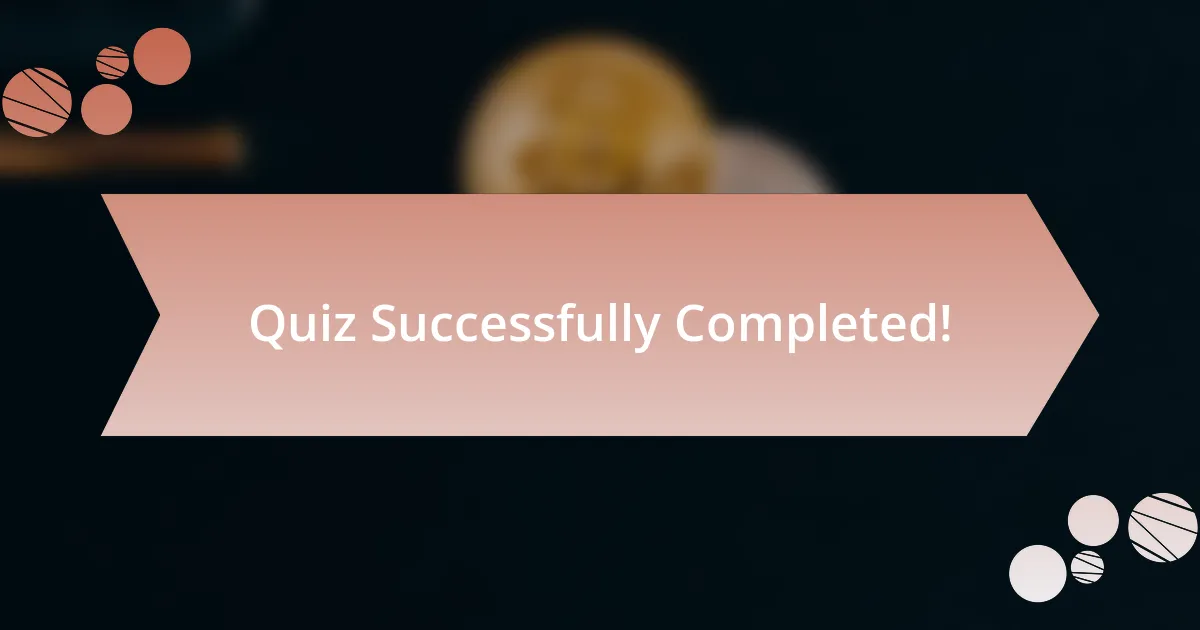
Quiz Successfully Completed!
Congratulations on completing the quiz on NFT Ownership Rights! You’ve taken an important step towards understanding the complexities surrounding digital assets. This topic is evolving rapidly, and your engagement shows a willingness to dive deeper into the world of NFTs.
Throughout the quiz, you likely discovered various aspects of NFT ownership, including the rights and limitations that come with owning these digital tokens. Understanding these nuances is crucial, especially as the market matures. Knowledge about copyright issues and resale rights can empower you as a collector or creator.
To continue expanding your understanding, we invite you to explore the next section on this page. Here, you’ll find more detailed information about NFT Ownership Rights. This resource will help solidify what you’ve learned and provide further insights into how to navigate this intriguing digital landscape. Enjoy your journey into the world of NFTs!
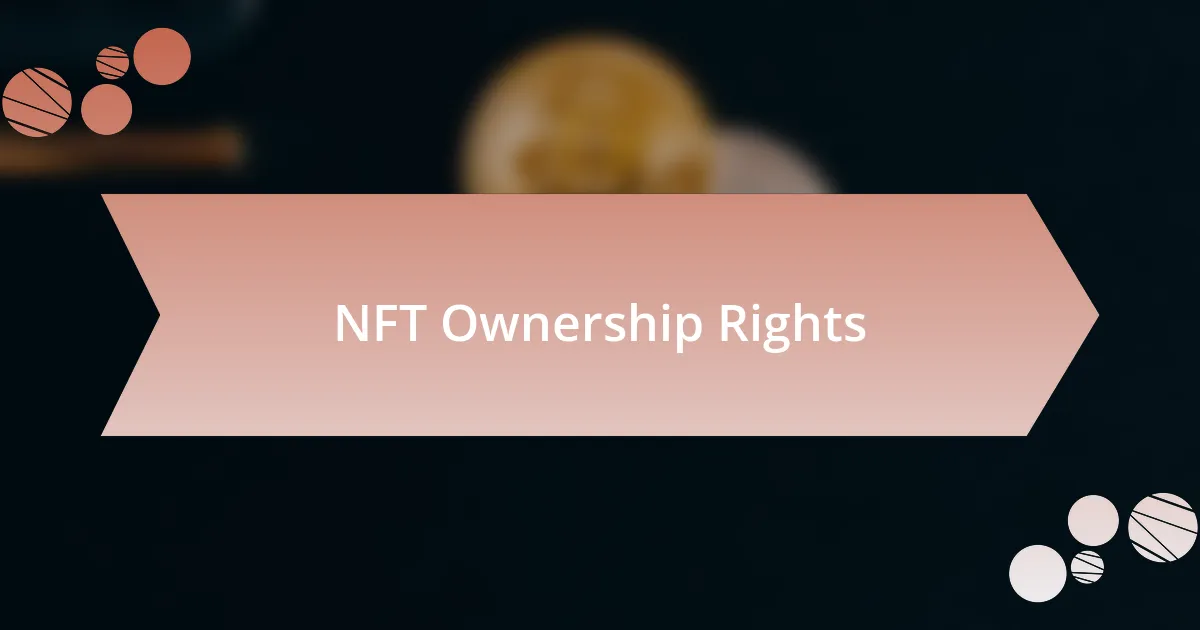
NFT Ownership Rights
Understanding NFT Ownership Rights
NFT ownership rights refer to the legal entitlements associated with non-fungible tokens (NFTs). When someone purchases an NFT, they obtain ownership of a digital asset, often linked to a specific piece of art, music, or other media. However, owning an NFT does not necessarily confer copyright or intellectual property rights over the underlying asset. Instead, it generally grants the ability to sell, trade, or display the NFT. Ownership rights can vary based on the terms set by the creator, indicating that buyers should understand what rights they acquire upon purchase.
Types of Rights Associated with NFTs
NFT ownership can involve several different rights. Firstly, there is the right to resell the NFT on various marketplaces. Secondly, the right to display the NFT publicly may be granted, allowing owners to showcase their collection digitally. Some creators may also include licensing rights, permitting owners to use the content in specific ways. However, the scope of these rights is determined by the original smart contract or sales agreement associated with the NFT, meaning not all purchases will include the same rights.
Implications of Copyright in NFT Ownership
Copyright law intertwines with NFT ownership but does not directly apply to ownership of the NFT itself. Purchasing an NFT usually does not grant copyright or reproduction rights to the digital work. Instead, it can provide ownership of the token that signifies authenticity and provenance. This distinction means that while an NFT can prove ownership, it does not automatically allow the owner to use, reproduce, or profit from the underlying content unless explicitly stated. Therefore, buyers must evaluate the specific rights linked to each NFT carefully.
What Happens in NFT Resales?
When an NFT is resold, ownership rights transfer to the new owner. The original creator may embed royalties into the smart contract, ensuring they receive a percentage of each subsequent sale. This feature incentivizes artists and creators by providing ongoing revenue. However, the new owner’s rights to the NFT will still depend on the original agreement, meaning they might face limitations on how they can use or display the asset.
Legal Challenges Surrounding NFT Ownership Rights
The legal landscape for NFT ownership rights is still evolving. Disputes may arise regarding the interpretation of rights associated with NFTs, especially in the context of copyright and trademark laws. Jurisdictions may differ in their approaches to protecting digital art and ownership rights. Additionally, the decentralized nature of blockchain complicates legal enforcement. These factors highlight the importance of clarity in contracts when creating and selling NFTs to avoid potential legal ambiguities.
What are NFT ownership rights?
NFT ownership rights refer to the legal entitlements that come with owning a non-fungible token (NFT). These rights can vary based on the terms set by the creator and the platform. Generally, ownership of an NFT signifies that the holder has the right to sell, transfer, or display the asset. However, it does not automatically grant copyright or intellectual property rights to the underlying content associated with the NFT unless explicitly stated in the terms of sale.
How do NFT ownership rights work?
NFT ownership rights work through blockchain technology, which records every transaction. When an individual purchases an NFT, they receive a unique digital certificate on the blockchain, representing their ownership of that specific item. The rights associated with the NFT depend on the contract defined by the creator, which may include aspects like reproduction rights and resale rights.
Where can I find information about NFT ownership rights?
Information about NFT ownership rights can be found on various platforms and marketplaces that sell NFTs, such as OpenSea, Rarible, and Foundation. Additionally, legal resources or articles from experts in intellectual property law can provide insights into the specific rights associated with NFT ownership. Important guidelines and community standards are often published on these platforms.
When do NFT ownership rights transfer?
NFT ownership rights transfer at the moment the transaction is completed and recorded on the blockchain. This occurs when the buyer’s payment is confirmed, and the NFT is officially moved to the buyer’s wallet. The transfer process is typically instantaneous, making it a secure way to establish ownership.
Who is responsible for defining NFT ownership rights?
The creator of the NFT is primarily responsible for defining ownership rights. When minting an NFT, they can set specific terms and conditions, which dictate what the buyer can do with the token. Additionally, platform policies may influence these rights, making it essential for buyers to read and understand both the creator’s terms and the platform’s guidelines before purchase.

